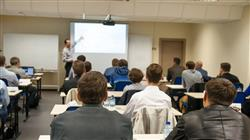University certificate
The world's largest school of languages”
Introduction to the Program
With a methodological design based on proven teaching techniques, this Postgraduate certificate will take you through different teaching approaches, to allow you to learn in a dynamic and effective way”

This program will delve into the most methodological part, from the view of analysis and analyzing the SFL teaching models, in a critical and detailed way.
The teaching/learning process is influenced by a multidisciplinary approach by definition, which means that the future Spanish language teacher has to consider various educational aspects when complementing his or her education. Consequently, relevant subjects from disciplines such as Pedagogy, Psychology or Educational Technology will be included in their studies. This knowledge will lead the student in this subject to develop a broader idea of linguistics and how it is influenced by other aspects, which in turn will guide his or her professional work.
Throughout the presentation of the subject, the student will delve into various realities of applied linguistics, ranging from the situation in the classroom, to the moments of preparation by the teacher.
The teacher will be able to explain and resolve confusing questions regarding grammar or the evaluation process of their students. It will have a complete vocabulary teaching methodology and different techniques and didactic materials, taught by distinguished experts in the field, with extensive experience in the educational sector.
At the end of this Postgraduate certificate you will have the knowledge and strategies necessary to teach in a second language"
This Postgraduate certificate in Theories, Approaches and Methods in the Teaching of Second Languages offers you the characteristics of a high-level teaching and technological program. These are some of its most notable features:
- The latest technology in online teaching software
- Highly visual teaching system, supported by graphic and schematic contents that are easy, to assimilate and understand
- Practical cases, presented by practising experts
- State-of-the-art interactive video systems
- Teaching supported by telepractice
- Continuous updating and recycling systems
- Autonomous learning: full compatibility with other occupations
- Practical exercises for self-assessment and learning verification
- Support groups and educational synergies: questions to the expert, debate and knowledge forums
- Communication with the teacher and individual reflection work
- Content that is available from any fixed or portable device with an Internet connection
- Supplementary documentation databases are permanently available, even after the program
Expert teachers in the field have meticulously designed this program, applying all their experience and knowledge in the elaboration of this program"
The teaching staff includes teaching professionals, who bring their experience to this training program, as well as renowned specialists belonging to leading societies and prestigious universities.
The multimedia content, developed with the latest educational technology will provide the professional with situated and contextual learning, i.e., a simulated environment that will provide immersive training, programmed for training in real situations.
This program is designed around Problem-Based Learning, whereby the educator must try to solve the different professional practice situations that arise throughout the program. For this purpose, the student will be assisted by an innovative interactive video system created by, renowned specialists experienced in the field of education.
Our innovative telepractice approach will give you the opportunity to learn through a hands-on experience, which will provide you with a faster integration and a much more realistic view of the content"

Master, with this program, the most effective methodology and ways of working in the teaching of in a second language"
Why study at TECH?
TECH is the world’s largest online university. With an impressive catalog of more than 14,000 university programs available in 11 languages, it is positioned as a leader in employability, with a 99% job placement rate. In addition, it relies on an enormous faculty of more than 6,000 professors of the highest international renown.

Study at the world's largest online university and guarantee your professional success. The future starts at TECH”
The world’s best online university according to FORBES
The prestigious Forbes magazine, specialized in business and finance, has highlighted TECH as “the world's best online university” This is what they have recently stated in an article in their digital edition in which they echo the success story of this institution, “thanks to the academic offer it provides, the selection of its teaching staff, and an innovative learning method aimed at educating the professionals of the future”
A revolutionary study method, a cutting-edge faculty and a practical focus: the key to TECH's success.
The most complete study plans on the university scene
TECH offers the most complete study plans on the university scene, with syllabuses that cover fundamental concepts and, at the same time, the main scientific advances in their specific scientific areas. In addition, these programs are continuously being updated to guarantee students the academic vanguard and the most in-demand professional skills. In this way, the university's qualifications provide its graduates with a significant advantage to propel their careers to success.
TECH offers the most comprehensive and intensive study plans on the current university scene.
A world-class teaching staff
TECH's teaching staff is made up of more than 6,000 professors with the highest international recognition. Professors, researchers and top executives of multinational companies, including Isaiah Covington, performance coach of the Boston Celtics; Magda Romanska, principal investigator at Harvard MetaLAB; Ignacio Wistumba, chairman of the department of translational molecular pathology at MD Anderson Cancer Center; and D.W. Pine, creative director of TIME magazine, among others.
Internationally renowned experts, specialized in different branches of Health, Technology, Communication and Business, form part of the TECH faculty.
A unique learning method
TECH is the first university to use Relearning in all its programs. It is the best online learning methodology, accredited with international teaching quality certifications, provided by prestigious educational agencies. In addition, this disruptive educational model is complemented with the “Case Method”, thereby setting up a unique online teaching strategy. Innovative teaching resources are also implemented, including detailed videos, infographics and interactive summaries.
TECH combines Relearning and the Case Method in all its university programs to guarantee excellent theoretical and practical learning, studying whenever and wherever you want.
The world's largest online university
TECH is the world’s largest online university. We are the largest educational institution, with the best and widest online educational catalog, one hundred percent online and covering the vast majority of areas of knowledge. We offer a large selection of our own degrees and accredited online undergraduate and postgraduate degrees. In total, more than 14,000 university degrees, in eleven different languages, make us the largest educational largest in the world.
TECH has the world's most extensive catalog of academic and official programs, available in more than 11 languages.
Google Premier Partner
The American technology giant has awarded TECH the Google Google Premier Partner badge. This award, which is only available to 3% of the world's companies, highlights the efficient, flexible and tailored experience that this university provides to students. The recognition as a Google Premier Partner not only accredits the maximum rigor, performance and investment in TECH's digital infrastructures, but also places this university as one of the world's leading technology companies.
Google has positioned TECH in the top 3% of the world's most important technology companies by awarding it its Google Premier Partner badge.
The official online university of the NBA
TECH is the official online university of the NBA. Thanks to our agreement with the biggest league in basketball, we offer our students exclusive university programs, as well as a wide variety of educational resources focused on the business of the league and other areas of the sports industry. Each program is made up of a uniquely designed syllabus and features exceptional guest hosts: professionals with a distinguished sports background who will offer their expertise on the most relevant topics.
TECH has been selected by the NBA, the world's top basketball league, as its official online university.
The top-rated university by its students
Students have positioned TECH as the world's top-rated university on the main review websites, with a highest rating of 4.9 out of 5, obtained from more than 1,000 reviews. These results consolidate TECH as the benchmark university institution at an international level, reflecting the excellence and positive impact of its educational model.” reflecting the excellence and positive impact of its educational model.”
TECH is the world’s top-rated university by its students.
Leaders in employability
TECH has managed to become the leading university in employability. 99% of its students obtain jobs in the academic field they have studied, within one year of completing any of the university's programs. A similar number achieve immediate career enhancement. All this thanks to a study methodology that bases its effectiveness on the acquisition of practical skills, which are absolutely necessary for professional development.
99% of TECH graduates find a job within a year of completing their studies.
Postgraduate Certificate in Theories, Approaches and Methods of Second Language Teaching
At TECH Global University, we present the Postgraduate Certificate in Theories, Approaches and Methods in Second Language Teaching, an exceptional opportunity to acquire specialized knowledge in language teaching online. Our classes offer you the convenience of learning from anywhere and at any time that best suits your routine. Through our online platform, you will have access to up-to-date content and quality resources that will allow you to develop pedagogical skills and master the most effective approaches and methods in second language teaching. In this Postgraduate Certificate, you will explore the linguistic theories and psychological foundations that support language teaching. You will learn innovative approaches and didactic strategies to motivate students, encourage independent learning, and improve fluency and accuracy in the second language. In addition, you will become familiar with the latest educational technologies that can enhance your skills as a teacher. Second language teaching is a constantly evolving and in-demand field. With the training we provide, you will be prepared to meet the challenges of today's language teaching and stand out as a highly skilled professional. You will be able to apply your knowledge in educational institutions, language centers, international companies and other organizations that require experts in second language teaching.
The digital evolution makes it easier for you to study 100% online.
Benefit from the advantages of online classes, where you can interact with expert teachers and other participants, share experiences and enrich your learning through collaborative activities. You will also have access to additional resources, such as online libraries and support materials, which will allow you to delve deeper into the topics of interest and broaden your educational perspective. Don't miss the opportunity to become a reference in second language teaching. Join the Postgraduate Certificate in Theories, Approaches and Methods in Second Language Teaching at TECH Global University and boost your professional career in the field of language education.







